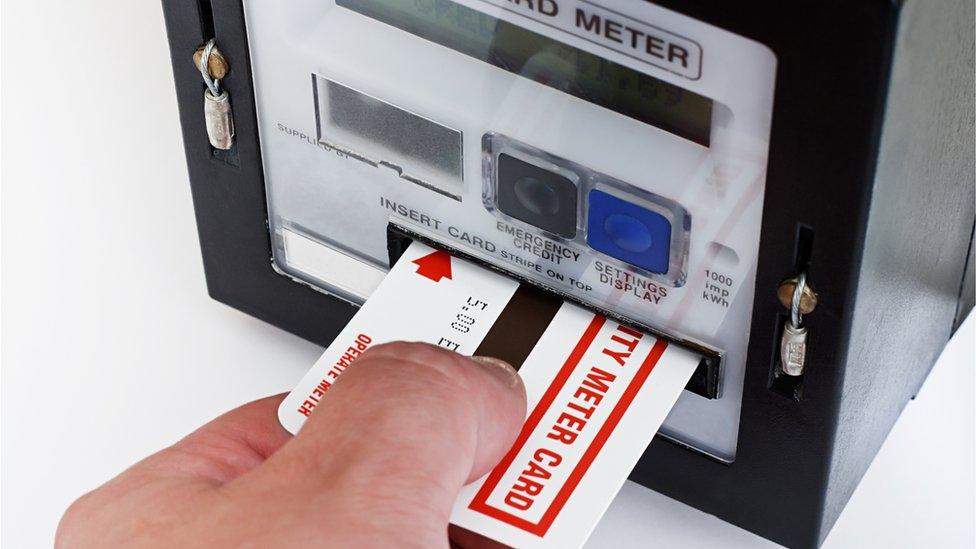Energy crisis pushing people onto prepayment meters, says Uswitch
- Published
- comments

The energy crisis is pushing more households onto prepayment gas and electricity meters, research suggests.
Comparison website Uswitch said 60,000 new meters were installed in Britain in the six months to March, reversing a long-term trend of the number falling.
It says prepayment customers are more likely to be vulnerable and at risk of being, in effect, disconnected when they cannot afford to top up.
Ministers promised to focus energy support on the most vulnerable in 2023.
Most UK households pay their gas and electricity bills by direct debit, typically receiving quarterly bills.
But using data from energy regulator Ofgem, Uswitch found that almost 7.4 million prepayment meters - either for gas or electricity - had been installed in Britain by March, up from over 7.3 million in October last year.
Uswitch said suppliers may put customers on prepayment meters if they struggle to keep up with bills, because it helps them control how much and how often they pay for energy.
Have you had a prepayment meter installed? Please share your experiences with us by emailing haveyoursay@bbc.co.uk, external.
But it also said prepayment customers could choose to "self-disconnect" when costs got too high and faced higher standing charges for electricity. They are also unable to smooth bill rises over the year.
Based on current trends, Uswitch says around 10,000 prepayment meters will be installed a month this winter, leaving thousands more households at risk.
Richard Neudegg, director of regulation at the site, said the "worrying" trend followed more than two years in which the number of meters fell.
"With energy prices set to rise again in April, this is a warning of things to come and we will most likely see more and more households moved to prepayment meters in the coming months and years," he said.
"Families and individuals on prepayment meters will be plunged into darkness as they self-disconnect when they can't afford to top up."


This research from Uswitch comes a week after the organisation End Fuel Poverty Coalition called on the government to temporarily block households from being moved onto prepayment meters.
While occasionally people may opt to be transferred to a prepayment box, for most households it's not a choice as a meter is often installed as part of a plan to repay debt owed to energy suppliers.
It's those who are already in financial hardship who find themselves transferred to a system which is more expensive to run and has the risk of households being totally without heat and energy when credit runs out.
The anti-poverty collective, which includes Asthma + Lung UK, want the government to immediately suspend all forced transfers of households onto more prepayment meters, whether by court warrant or remotely via smart meters.
The current rules state that prepayment meters can only be installed if it is "safe and reasonably practicable" to do so. The End Fuel Poverty Coalition believes it's not possible that any enforced installation could meet those conditions this winter so the government should make sure energy companies are sticking to the rules.

Gas and electricity prices have soared this year, largely as a result of the war in Ukraine.
The government has limited energy bills and prepayment meter costs until next April, meaning the typical household is paying about £2,500 a year.
Without that intervention, that annual bill would have been £3,549 a year. Last winter it was £1,277 a year.
New Chancellor Jeremy Hunt has said the government will scale back its support after April 2023 while protecting the most vulnerable. But it is unclear what help will be available, raising concerns that more people could face hardship with bills forecast to rise above £4,000.
Uswitch is urging the government to prioritise those on pre-payment meters next year.
The Department for Business said the government's Energy Price Guarantee would reduce bills this winter by "roughly a third" of what they otherwise would have been. It added that the most vulnerable households were receiving £1,200 in additional direct payments.
A spokeswoman said the Treasury's review of energy support from next April would focus help on "those in need" while reducing costs for the taxpayer.
- Published18 October 2022

- Published1 October 2022

- Published19 October 2022
